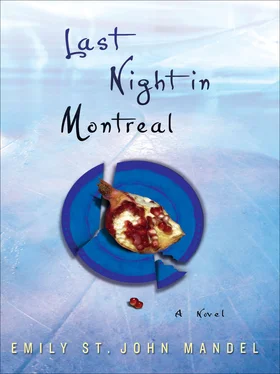“My name is Christopher Graydon. I’m a private investigator. I’d like to ask you a few questions.”
“Not here,” she said.
Michaela’s father returned from the United States in a wheelchair. He spent hours staring out the window in the living room, blinking and sometimes shaking his head. Private nurses came and went. His car had gone sideways off a highway in the mountains, he said. When pressed he was able to give the date of the accident, but he was vague on the question of how exactly it had occurred. He said he might have fallen asleep at the wheel. Over the next two years he began walking on crutches, and then with a cane, stiffly, dragging one leg, not at all like the way he had walked before. He was given light assignments by the private investigative agency, mostly photographing cheating spouses from cars, and he drew a small pension from his years on the police force.
There was no more talk of Lilia’s case. He told Peter the trail had gone cold; Peter reported that Lilia’s mother had screamed at him and threatened to sue. But in the few years that followed Christopher used to disappear for a few days at a time, traveling back into the States whenever he could. Just a long weekend sometimes, driving from Friday to Monday and arriving at work on Tuesday exhausted and worn. He had decided before the accident not to chase them anymore, but the circumstances of the accident made him fear for Lilia’s safety. He would never bring her in, not anymore; all he wanted now was to watch over her. Michaela had been reading his notes for years, but his notes were only part of it: the other part was the way he woke up at night in his bed in Montreal and knew where Lilia was, the way he could glance at a map of the United States and realize with absolute, inexplicable certainty that she was in West Virginia, the way he tried to ignore his terrifying clairvoyance and forget where she was and couldn’t, the way he knew where she was but had to keep driving south to check, the horror of always being right: he saw her face in the crowd on Sunset Boulevard, he stepped into a hardware store in St. Louis at the moment she stepped out of the deli across the street, he stood on a corner in a run-down neighborhood in Chicago and watched her emerge from an apartment building down the block. After each sighting he returned north more depleted, more frightened, less intact.
The last time Michaela saw him was in the evening, when he’d just returned from the United States. She’d lost her job earlier in the day. In the six years since she’d left high school she’d fallen into a pleasant double life: she worked at a clothing store five days a week and walked on ferociously dangerous tightropes strung across alleyways in the old city on weekends. But her manager had fired her in the early afternoon for speaking the wrong language on the sales floor, walked her to the door, shaken her hand when they got to the street. “Good luck,” he’d said brightly, as if she were a needy stranger to whom he’d given a quarter, as though he hadn’t just put her out of a job. “I hope things go well for you.”
“I hope you die,” Michaela said sweetly. She turned away from his aghast expression and soundlessly moving lips and wandered down the street in the cool September light, hands in her pockets and shaking inside, and the store receded instantly into the distant past; it seemed inconceivable that she’d gone to work there just that morning. It seemed inconceivable that she’d been living a life so ordinary for so long now, so long, living in her father’s house in the almost-suburb of Westmount and folding clothes for a living. People were talking and laughing and the leaves on the trees hadn’t fallen yet. The air was bright. A little girl was playing a violin at the corner of St. Catherine and McGill; she was no older than ten, and her face was a vision of impeccable serenity. Michaela stood watching her face for a while, but she couldn’t hear the music above the din of her thoughts. A band of tourists passed, speaking English, and only then did she notice that everyone else walking past her was speaking French. It struck her that she’d rarely been so lonely, or so incompatible with the world, or so strange. She spent some time in the park and arrived home after nightfall, slightly drunk.
The newspapers had been collected from the front step. The front-step newspapers were a private marker; she let them pile up in the weeks when her father was traveling, and when they disappeared it meant he was home and she knew what to expect when she opened the front door. When she came in this evening, her father was eating dinner in the dining room. He looked up and smiled briefly as she walked into the room; she sank into a chair across the table from him and sat watching him eat for a moment.
“Where did you go this time?”
He swallowed, and took a sip of water before he answered. “Chicago,” he said.
“Chicago.”
“Yes.” He swallowed another spoonful of soup and took a bite of bread. “I was following a lead.”
“You were following Lilia.”
There was an uncomfortable pause, during which he finished his bread, sipped at his water again, and set the glass back down on the table with perhaps slightly more force than was strictly necessary.”
“Well,” he said, “I suppose that’s one way of looking at it, yes. I was interviewing a girl who knew her there.”
“What was her name?”
“Erica.”
“What was she like?”
He hesitated a moment. “She was sad,” he said. “How was your day?”
“I lost my job.”
“At the clothing store? I’m sorry,” he said. “You were laid off? Business was slow?”
“Fired, actually. I said hello to a little kid on the sales floor. His mother complained to the manager.”
“Why would she complain to the manager? That doesn’t make any sense.”
“It makes perfect sense,” said Michaela. “I said hello in English.”
“Oh,” he said.
“She felt quite strongly about the issue, apparently.”
“Zealots,” said Christopher. He shook his head. “You just have to ignore them. What did your manager say?” It occurred to him that this was the most substantial conversation he could remember having with his daughter since she was nine or ten, or possibly ever, and he tried not to look pleased.
“He was regretful. Said she’d told him she was going to call the language commission, said he liked me but we’d been through this before and he couldn’t afford to be fined by the language police again, hoped I understood, but I don’t.”
“Don’t what?”
“Understand. I don’t understand this place. I liked working there.”
“Well. I don’t think it’s right either. But maybe there’s a chance of getting your job back in a week or two, once he calms down a little. How did you leave off with him?”
“I told him to drop dead,” said Michaela.
He wasn’t sure he’d heard her correctly. There was a certain look about her eyes that reminded him of her mother. He dipped a piece of bread in his soup and ate without looking at her.
“Listen,” he said, “I’ve got some news of my own. I’m selling the house. An appraiser’s coming by tomorrow.”
“What? Why?”
“I need the money,” Christopher said, “to be honest with you.”
“You have a job.”
“I do,” he said. “Photographing people from cars, mostly. But I want to do some traveling, so I’m going to have to leave the job for a while.”
“Don’t you have savings?” she asked.
“I did,” he said.
“But where will we live?”
“Well,” he said, “I’ll be traveling. And you, well, I thought maybe you might want to find your own place one of these days. Have a little independence, maybe live closer to downtown?”
Читать дальше












